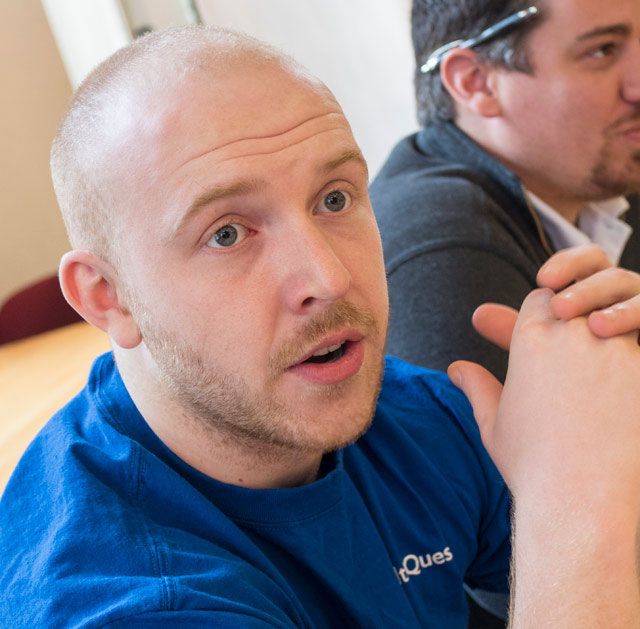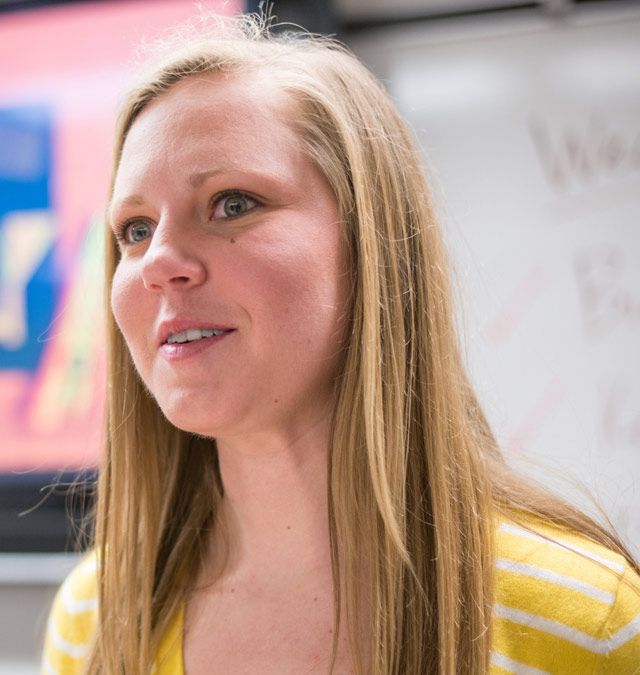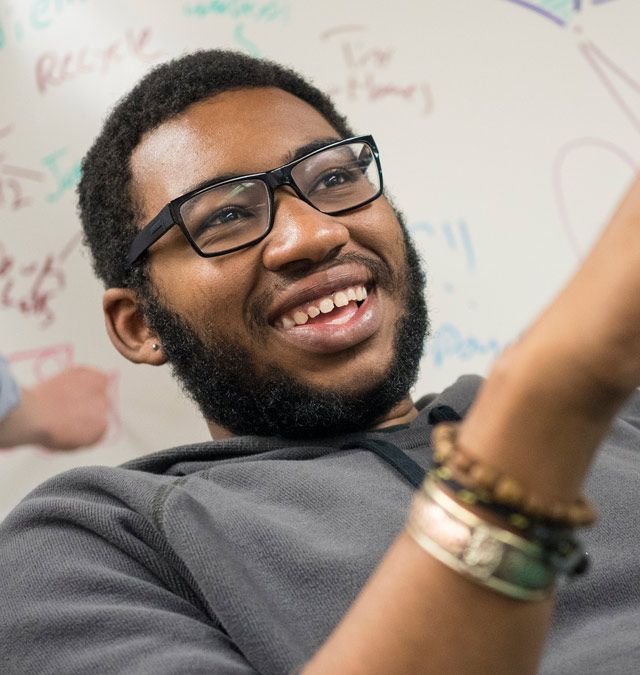Known for innovating in the world of entrepreneurial education, Lehigh University launched its own startup, of sorts, in the summer of 2012.
This startup doesn’t produce goods or services. Instead, it turns out alumni who will go on to create such goods and services themselves – or help others to do so – in a well informed and highly innovative way.
Developed in response to society’s growing interest in entrepreneurship and to ever-increasing student inquiries, the master’s of engineering (M.Eng.) in Technical Entrepreneurship (TE) combines graduate engineering education with real life application in the context of entrepreneurship to provide training in the art and practice of creating new companies. It fills a recognized industry need while drawing on institutional strengths in the teaching of integrated product development, technology innovation, and entrepreneurship.
Now in its fifth year, the M.Eng. in TE is offered through the department of mechanical engineering and mechanics in the P.C. Rossin College of Engineering and Applied Science in collaboration with the Baker Institute for Entrepreneurship, Creativity and Innovation.
The program attracts students from a wide variety of academic disciplines and work experiences. The full-time, twelve-month residential program is unique in that it features a dedicated curriculum comprised of 12 courses in which only TE master’s students are able to enroll, taught by dedicated faculty members hired specifically to create and orchestrate the program, offered in a dedicated space open 24/7 exclusively for TE master’s students.
Those enrolled in the program also have access to Lehigh’s first Creativity and Innovation Lab, an amazing venue that bustles with activities such as 3D printing, electronics, and prototyping. Lauren Purdom earned both her B.S. in bioengineering and her M.Eng. in TE at Lehigh. “Having so many resources at my disposal – everything from an Arduino prototyping platform to a soldering station – enabled me to bring my ideas to life,” she says. “Before starting the TE master’s program, I never would have imagined myself being so comfortable working with additive manufacturing, but now I can say I built my own 3D printer…and it worked!”
Students travel through the program as members of a cohort and have opportunities to explore problems collaboratively while also developing their own products and services independently of one another. They grow close as a result and benefit immeasurably from the synergy produced by the combination of these two ways to learn.
Brian Flynn, who earned his B.S. in finance and marketing at Marist College and his M.Eng. in TE at Lehigh, puts it this way: “we emerged from the TE master’s program with a common knowledge base, mindset, and desire to stay in touch with one another… in part because of the extent to which this experience truly transformed our lives.”
Eighty-four students graduated in the first four years of the program, with the 23 students comprising the fifth cohort expected to receive their degrees in summer 2017.
“Four distinctive career paths have evolved,” notes Michael Lehman, M.D., M.B.A., Lehigh TE professor of practice. “Our graduates have gone on to launch their own companies, serve as influential team members in startups, innovate within more established companies, and catalyze other emerging entrepreneurs.”
Their stories are truly impressive and illustrate the value of the M.Eng. in TE experience.
Launch a company
Creativity, passion, knowledge, skills, support, and opportunity – when present at the same time in the same space – can turn a dream into a reality.
Take Jessie Garcia (photo, above) for example.
Jessie founded Tozuda, LLC after earning her M.Eng. in TE at Lehigh. The patent-pending technology that forms the underpinning of her first product was developed during the year she spent in her master’s program. In her words, “having an idea is one thing. Translating it into a product is something else entirely. That’s where the TE master’s program comes in.”
Her experience playing rugby at Lehigh as an undergrad global studies major, combined with today’s national spotlight on head injuries, inspired her to create a sensor that detects a potentially dangerous level of force to the head. Tozuda’s first entry to market, the Cabezon, attaches to hardhats to promote brain injury awareness in the construction industry. Two additional sensors, the Nitron and the Shipoh, are being developed for the sporting goods and shipping industries, respectively.
TE graduates have also launched startups in product development and manufacturing, digital media and marketing, management consulting, fashion, jewelry, the toy industry and athletic equipment. These entrepreneurs and others from their cohorts envisioned the next big thing…and are seeing their efforts pay off.
Join an entrepreneurial team
A significant number of M.Eng. in TE alumni have embraced opportunities to join entrepreneurial ventures in the startup or growth phase – often earning equity as well as a salary – rather than set off with their own companies right out of the gate. And a few have joined family ventures as the next generation of entrepreneur. In some cases, the idea is to gain confidence and experience which will bolster an eventual startup launch. In others, the affiliation is an end unto itself.
Brandon Evanko always planned to join the family business, BRUNS-PAK (BP). Founded by Brandon’s father, Lehigh alumnus Mark Evanko ’79, BP leads the data center solutions industry in offering a full array of services which include consulting, design work, and construction. BP’s impressive client list features powerhouse Fortune 500 companies, Ivy League educational institutions, and government agencies.
After earning his B.A. in economics at Franklin and Marshall College, Brandon enrolled in Lehigh’s TE master’s program. He was brought on board at BP as Project Engineer once he completed his master’s degree, and he eventually hopes to run the company.
“All of my educational choices have been shaped by the idea that I might one day be able to take over the reins and do a great job doing so,” he says. “Getting my M.Eng. in TE degree was the best academic decision I’ve ever made… nothing else even comes close.”
TE grads have affiliated with entrepreneurial endeavors focused on logistics and supply chain management, transit technology, fine art, marketing, eCommerce, and business intelligence solutions.
Catalyze emerging entrepreneurs
Some who are passionate about entrepreneurship find their calling in sharing their knowledge and skills to help others succeed in the field.
As Katelyn Noderer observes, “entrepreneurship education is really about teaching students a new way of problem solving and empowering them to go out and change the world.”
Katelyn graduated from Lehigh with a B.A. in psychology and design arts, served two years with the Peace Corps in Ukraine, and earned her M. Eng. in TE in 2013. As Associate Director of the Center for Entrepreneurial Studies at Stanford Graduate School of Business, she has the opportunity to make a difference in the lives of hundreds of students each year, and she derives tremendous satisfaction from teaching them a process that can be leveraged to solve problems, make life decisions, and achieve goals.
“I never would have had the skills and, perhaps most importantly, the passion for this position,” she says, “if I hadn’t gone through the TE master’s program.”
Higher education is just one arena in which TE alums are making a difference. Other grads are teaching, mentoring, and guiding emerging entrepreneurs in such fields as computer software, product development and startup management.
Innovate within a corporation
Kris Lynch, who earned both his B.S in mechanical engineering and his M.Eng. in TE at Lehigh, knew he felt drawn to the established corporate world. The unique blend of product design and business acumen inherent to the TE master’s curriculum enabled him to land a position with IBM after receiving his master’s degree.
As a UX (User Experience) Design Strategist Consultant, Kris’s work takes place at the intersection of technology and business. Many of his IBM responsibilities fall in the areas of project management, marketing, and UX design, allowing him to maximize use of his graduate education. “The skills I learned and the relationships I established while in the TE master’s program truly changed my life,” Kris says.
And he’s not alone.
Cassie Tian, who holds a both a B.S. in bioengineering and an M. Eng. in TE from Lehigh, was hired by Catalent Pharma Solutions. “Going through the TE master’s program was the transition point of my life,” she notes. “I discovered talents I never knew I had.”
Many TE alums – who are quick to say they share these sentiments – are working in fields such as telecommunications, digital advertising, drug delivery systems technology, management and technology consulting, gases and engineering, construction, and building products.
Program impact
The TE master’s program prepares students to launch a startup, to get in on the ground floor of startups launched by others, to innovate at more established companies, to nurture other entrepreneurs …or to do it all.
Jon Akers is one of the most striking examples of entrepreneurial agility to emerge from the TE program to date. Since receiving his B.S. in finance and his M.Eng. in TE, both from Lehigh, he has co-founded two bicycle-related startups, joined two entrepreneurial teams, innovated at two established global corporations, and offered his hand to others just starting their entrepreneurial journey.
While his story is unique, his preparation is not. This is what TE grads learn to do, and this is the extent to which their education is applicable, transferrable, and relevant.
“Startups are where the jobs are… and where they’re going to be,” says Will Brennan, who earned his B.S. in civil engineering from Bucknell before enrolling at Lehigh to pursue his master’s degree. “The TE master’s program cultivates a mindset conducive to success.”
Four years after its inception, the TE master’s program is thriving and leaving its mark on the entrepreneurial world.
“Students are using their newly-developed skill set in creativity, innovation and entrepreneurship in exciting ways,” observes Michael Lehman. “In many respects, their development parallels the prototyping process that’s so critical to entrepreneurship – they iterate, they pivot, they build on past successes, and they learn from failures along the way.”
And these alumni are well connected. “As a result of the TE experience,” Lauren Purdom says, “my network increased tremendously. I’d meet someone new and they’d connect me to someone else; this happened over and over again. Actually, come to think of it, it’s still happening!”
Ask TE alums to talk about the program and they’ll speak at length with great enthusiasm. They’ll explain in rich detail what they see as having been an invaluable experience, one that – in just 12 months – provided them with the real and virtual tools they need to make it as entrepreneurs. They’ll rave about the extent to which they gained exposure to cutting-edge thinking and emerging technologies. And they’ll bring up what they see as a major ROI every time.
Zack Gow, who earned both his B.A. in behavioral neuroscience, physics and his M. Eng. in TE at Lehigh, is among those who praise the applicability and transferability of his graduate degree. “I can confidently say that I have the passion, the foundation, and the tools to start my own ventures – in whatever domain I choose – thanks to the TE master’s program.”
If the success of a startup is measured, at least in part, by the degree to which it meets a need, creates demand, and delivers on its promise, then this Lehigh startup – the M.Eng. in TE program – certainly is well on its way.
Story by Beverly Kochard ’78G



